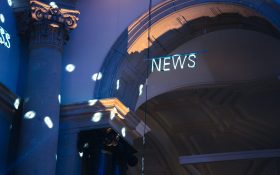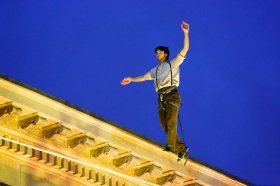For many creatives, the rigours of the last couple of years have thrown the spotlight on their personal and professional life goals. If you’ve decided it’s time to ditch the 9 to 5 and fully focus on pursuing your passion, read on for our top tips for success as a full-time creative entrepreneur.
Be prepared
Making the transition from employee to self-employed creative can be daunting, so it’s important to be prepared. The old business adage, ‘fail to plan = plan to fail’ still holds true. And with a report from the University of Technology Sydney showing that one in three small businesses folds within the first year, and half within two years, it’s worth doing your homework. Before you take that critical leap into the unknown be sure you have a solid foundation.
Fundamentally, this means having a realistic understanding of your financial position and knowing just how much income you need to generate to pay your bills each month. As a full-time creative practitioner trying to make a sustainable income you are necessarily an entrepreneur and small business owner. Do you need to set up a company? Have you applied for your ABN? Do you understand your taxation obligations? Importantly, there will never be a perfect time to give up your day job and go it alone, so for all your planning and preparation, at some point you just have to close your eyes and jump!
Libby Trainor Parker gave up the safety and security of a full-time senior teaching position to follow her dream of being a writer. ‘I had always wanted to be a writer but I didn’t think it was a “real job,” because real jobs were accountants, teachers, bus drivers, and the surly people who stamp your passport at airports. I also wanted to be a stand-up comedian, but that’s not a real job either. So I became a teacher. And that was sensible – it’s also similar to being a stand-up comedian due to the captive audiences.’
Now, a few years on, Trainor Parker has her own media company and is a shining example of what’s possible as a hard-working creative entrepreneur.
Own your goals
It’s important to set some realistic goals so you have something concrete to aim for. These goals are not just financial, although that’s obviously important. You should also set goals that articulate your creative and lifestyle aspirations too. These can be about the type of work you want to do, the hours you want to commit, or lifestyle opportunities such as travelling and working overseas. Having these goals and structures in place before you take the plunge is important and will allow you the time and headspace to fully focus on what you do. It will also help to keep you motivated when the going gets tough.
Think about your values too. Being self-employed gives you the freedom to really live your values, embodying them in what you do. Make them central to your goal setting. When it comes to imagining what’s possible, it’s important to be optimistic but not naïve. And be excited! Excitement and enthusiasm are attractive qualities and will help you find clients, colleagues and collaborators.
Play to your strengths
As a creative entrepreneur it’s critical to have some reliable sources of income. The best way to do this initially is to rely on what you know. If you’re a commercial photographer whose real passion is wedding photography or making photo-art, have that as your long-term goal and follow the 80-20 rule. When you set out, you might still make 80% of your income from product shots and only 20% from your artworks; over time, aim to see the balance change to 80% from your art and only 20% from your corporate clients. Don’t give up your existing clients until you know you have new sources of income. Many self-employed creatives are successful multi-hyphenates, using their skills and talents in multiple offerings.
Read: How to succeed in Generation Slashie
‘I started my own company, Expressions Media, and made my own “real job”. I started pitching stories, writing anything and everything for whomsoever wanted to pay me for it, and I even got on the stage and started doing comedy cabaret and, more recently, stand-up comedy,’ said Trainor Parker who will be on stage for the Adelaide Fringe and also runs a popular co-working space for creatives.
Find your USP
Traditional marketing theory talks about finding your unique selling proposition – your USP. As a creative entrepreneur, it’s important to have a clear idea of what you offer and how that differs from all the others out there. This means having a realistic understanding of the marketplace and the competition. While it’s not good practice to focus on what others are doing, it is important to find a point of difference that you can use as a strong selling point.
Play to the market
An important principle of business is to have something for everyone. Think of Tiffany & Co. and you think of $20,000 diamond rings; in reality, one of their most popular items globally is a $200 silver Tiffany keyring. Having work available at different price points allows you to diversify and generate sales from a wider client base. You might see yourself as an artist selling major pieces in a gallery for $10,000; making some smaller pieces priced at $1,000 means you can sell more works and get your name known by more people.
Having multiple offerings is another way to broaden your client base and expand your market. As Libby Trainor Parker said: ‘If I’m not performing, I’m writing; if I’m not writing, I’m running workshops on how to perform and write. It’s the “realest” job I’ve ever had, because it’s hard and it’s fun and I am totally dedicated to doing it well.’
Find your tribe
Going it alone doesn’t mean you have to be lonely. It’s important for your sanity to feel like you’re part of the community. Wherever you are you can tune into local meet-ups and networking groups for creatives. These are easy to find through social media and offer online and real-world opportunities. Groups such as Freelance Creatives of Adelaide (on Facebook, with over five thousand members) offers networking and can lead to new contacts, insights, and projects. And whatever your interest, there is probably a local organisation to tap into such as Writers Victoria and Craft NSW.
Step back
Any self-employed entrepreneur will tell you it can be tough. You often work long hours, face all kinds of challenges, and carry all the responsibility for your success or failure. But it’s also incredibly rewarding and good for the soul to be pursuing your passion.
Many people find they are constantly working so hard in their business that they never find time to work on their business. This means setting aside time to step back and review what you’re doing. Are you still in alignment with your goals? Reflect critically on what’s working for you and what’s not so successful.
Review your time management and your skill set too. Do you struggle with the financial side of the business? Maybe it’s time to find an accountant who specialises in the arts industry. Could you do more in social media to build your profile? Check out the local creatives and see if you can hire a specialist to manage your online presence. Diarising half a day every three months for a rigorous review will be time well spent.
Need help?
You don’t have to go it alone as you establish yourself as a creative entrepreneur. The Federal Government has a useful guide to starting a small business. There are also business advisory services and small business hubs in most states and cities, such as the Business Enterprise Centres.
Your local library or adult education centre will offer business and finance courses if you need to up-skill in these critical areas.
So, do your planning and preparation, set some meaningful goals, and make 2022 the year your passion transitions from being an idea to being a rewarding and sustainable career. The last word on the subject goes to creative entrepreneur Libby Trainor Parker: ‘Leaving a sensible job for the arts was scary, but once I took the leap, I never looked back and I have absolutely no regrets.’





